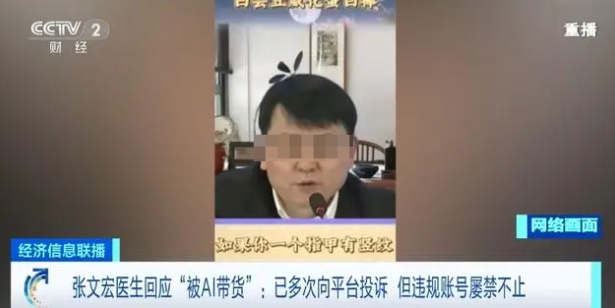Recently, AI face-changing technology has been used in live broadcasts to bring goods, which has attracted widespread public attention. An account that imitated Dr. Zhang Wenhong’s live broadcast of selling goods deceived many people, especially older viewers who were unfamiliar with AI technology. After the incident was exposed, Zhang Wenhong himself responded and said that he had complained to the platform many times. This incident highlights the risks of misuse of AI technology and the public’s shortcomings in discerning information.
Recently, a video has attracted widespread attention on the Internet. In the video, an account imitating Zhang Wenhong appeared in a live broadcast selling a protein bar.
Many netizens have questioned this, "Is Zhang Wenhong bringing goods?" What is even more worrying is that some older viewers are convinced of this video and have even placed orders and forwarded the information in social groups. After verification by reporters, it was discovered that Zhang Wenhong in the video was not a real person, but a deep forgery synthesized through AI technology.

In response, Zhang Wenhong said that there is more than one such sales account and it is constantly changing. He has complained to the platform many times. This has been going on for a few weeks and a complaint was initially made. Especially some older people who are not very familiar with AI will easily believe it.
With the development of artificial intelligence technology, the form of live broadcast with goods is constantly changing. Nowadays, AI technology can generate highly realistic faces and voices, which allows some criminals to use these technologies to commit fraud. Recently, the voice of a certain celebrity entrepreneur was synthesized by AI technology and spread online, causing a huge impact. Zhang Wenhong, who was synthesized by AI this time, performed very realistically during the live broadcast. Although there were still flaws on the technical level, he still deceived many people.
This incident has triggered public concern about the authenticity of information, especially among the elderly, whose awareness of new technologies is relatively lagging and vulnerable to deception. However, anyone, not just the elderly, may be at risk of being misled by AI falsified information. We cannot completely rely on individual judgment to identify this false information, so relevant technical precautions are particularly important.
During the live broadcast, the account imitating Zhang Wenhong did not clearly indicate his identity and only broadcast live at midnight. This secrecy shows the platform's efforts and effectiveness in managing AI chaos. Although the development of AI technology has brought us convenience, it has also brought new challenges to society. In order to deal with more counterfeiting that may occur in the future, it is urgent to establish a more complete risk prevention mechanism.
Highlights:
AI synthesized Zhang Wenhong caused heated discussions during the live broadcast, and some netizens misunderstood his identity.
The public’s awareness of new technologies lags behind and they are easily affected by false information.
It is crucial to strengthen technical prevention measures and information monitoring mechanisms and improve the public’s identification capabilities.
The risks brought by AI face-changing technology cannot be ignored. Platforms need to strengthen supervision and improve the public's information recognition capabilities in order to effectively deal with the challenges brought by AI technology. Only by strengthening national digital literacy education and popularizing prevention knowledge can we better protect our own rights and interests and build a safer network environment.